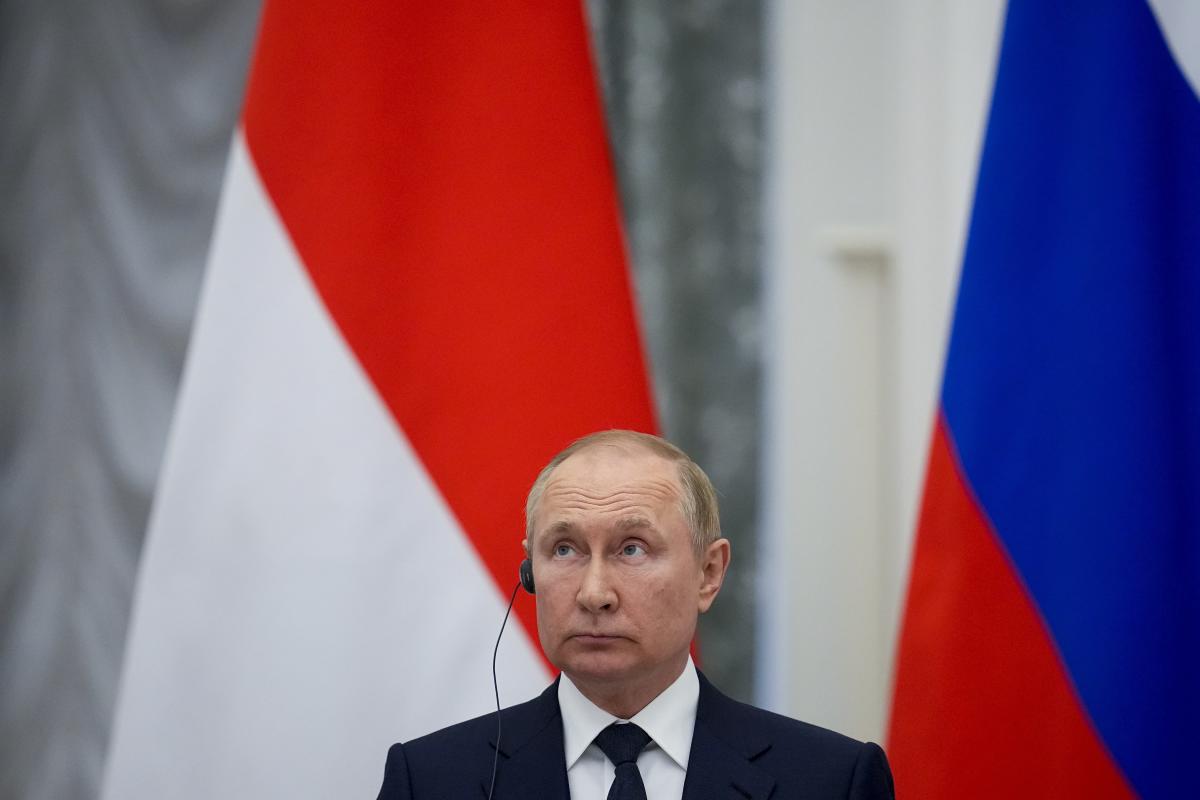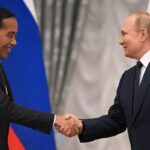
It has not been an easy week for Russian President Vladimir Putin.
He took his first foreign trip since the invasion of Ukraine to shore up relations with troublesome Central Asian allies. He watched as NATO declared Moscow its main enemy and invited Russia’s neighbors Sweden and Finland to join the alliance. And he was forced to deny that his troops had yet again attacked a civilian target in Ukraine.
Countering a show of Western unity over Ukraine at a series of summits in Europe this week, Putin has sought to cast the moves by the U.S. and its allies as a proof of their hostile designs, and he vowed to press the offensive against Russia’s neighbor, now in its fifth month.
Putin long has described NATO’s expansion to Russia’s borders as the top security threat to his country. When he sent troops into Ukraine on Feb. 24, he cited increasingly close military ties between Kyiv and the West as a key reason behind his action.
Russia’s aggression against its neighbor has helped cement Western unity, with allies offering billions of dollars in weapons and aid to Kyiv and slamming Russia with unprecedented sanctions that froze its hard currency reserves, targeted oil and other key experts, and barred its planes from European skies.
The invasion also prompted NATO to deploy more troops and weapons into the territories of its members in Eastern Europe and encouraged Sweden and Finland to abandon their neutrality and seek NATO membership.
At its summit in Madrid on Wednesday, the alliance formally invited the two nations to join and declared Russia the “most significant and direct threat” to its members’ peace and security.
Putin, who visited Turkmenistan Wednesday to attend a Caspian Sea summit with three former Soviet nations and Iran, responded by saying that NATO’s actions proved its anti-Russian focus while admitting his action helped Western allies cement their ranks.
At the summit in Ashgabat, Putin and other participants didn’t mention the war in Ukraine in their public comments. In a communique after the talks, they emphasized their agreement to bar any foreign militaries from the Caspian and underlined a pledge not to offer their territories for aggression against another country on its shores.
During a meeting with Iranian President Ebrahim Raisi on the sidelines of the summit, Putin emphasized “strategic” ties between Moscow and Tehran.
Speaking to reporters in Turkmenistan, Putin charged that the U.S. has “long been looking for an external enemy, for a threat that would help rally allies,” adding that “Iran wasn’t good enough for that role, and Russia fit much better.”
“We have given them a chance to unite all allies,” Putin said, noting that the NATO summit’s decisions offer a fresh proof that the Western group “is a relic of the Cold War intended to serve as an instrument of the U.S. foreign policy to keep its satellites in rein.”
Before the war, Russia insisted on binding guarantees precluding NATO’s expansion to Ukraine and other ex-Soviet nations and demanded a rollback of the military alliance’s deployments in Eastern Europe. The U.S. and its allies firmly rejected the demands, emphasizing that a key alliance principle is that membership is open to any qualifying country and no outsiders have veto power.
At the same time, Washington and NATO offered to discuss arms control, confidence-building measures, greater transparency and risk reduction — issues that Moscow shrugged off as secondary to its main security demands.
Until the invasion, the Kremlin denied having plans to attack but warned the West that NATO’s expansion to Ukraine and other ex-Soviet nations is a “red line” that must not be crossed.
Putin alleged the West had “swindled, blatantly cheated” Moscow by offering verbal pledges in the 1990s not to expand NATO’s eastward and then enlarged it to incorporate former Soviet bloc countries in Central and Eastern Europe and the ex-Soviet republics in the Baltics.
On Thursday, he spoke with his usual rancor about what he described as Western efforts to discourage Ukraine from sitting down for talks with Russia to negotiate an end to hostilities.
“The calls to Ukraine to continue fighting and to abandon any further negotiations confirm our belief that the united West and NATO do not care for Ukraine or the interests of the Ukrainian people, and that their goal is to protect their own interests,” Putin said. “The leading NATO members are using the Ukrainian people to reinforce their positions and their role in the world, reaffirm their hegemony and their imperial ambitions.”
Commenting on NATO’s invitation to Finland and Sweden, Putin rejected the Western description of the move as a major defeat for Russia.
“As for the assumption that we were fighting against NATO expansion to Ukraine but now have Sweden and Finland to deal with, there is no substance behind it at all, because for us Finland and Sweden joining NATO is not at all the same as the potential membership of Ukraine,” he said.
Sweden and Finland are free to do what they want, he said, but noted that “we will have to respond quid pro quo if military contingents and infrastructure are deployed there and create the same threats for the territories where they are created for us.”
He said Russia doesn’t have territorial disputes with those countries, unlike Ukraine, which has declared an intention to win back Crimea that Russia annexed in 2014 and regain control over the Moscow-backed separatist regions in the east, known as the Donbas..
“Ukraine is a totally different matter,” Putin said. “They were turning Ukraine into an anti-Russia, a bridgehead for trying to destabilize Russia.”
He hailed his forces in Ukraine as “heroes” protecting Russia’s security and said that the “special military operation” will continue until its goals of “liberating Donbas, protecting its people and creating conditions that will guarantee the security of Russia itself” are achieved.
Putin also denied that Russian forces targeted a busy shopping mall in the central Ukrainian city of Kremenchuk, saying that his country doesn’t hit civilian facilities and alleging the airstrike was directed at a nearby weapons depot, echoing the remarks of his military officials.
But that was disputed by Ukrainian officials and witnesses, who said a Russian missile directly struck the mall, killing at least 18 people, injuring dozens and leaving 20 others missing. Earlier in the war, Russia hit a hospital, theater, residential buildings and a railway station crowded with fleeting civilians.
Putin said the actions in Ukraine “are proceeding according to plan” and “our forces are moving forward and attaining the objectives that have been set for the particular period of the engagement,” adding that he wouldn’t rush the operation to minimize losses.
U.S. director of national intelligence Avril Haines said Putin apparently has gotten beyond the disappointment by the failure to quickly defeat Ukraine and may now hope that if Russia succeeds in crushing the Ukrainian military in Donbas, “that will lead to a slump basically in the Ukrainian resistance and that that may give them greater opportunities.”
__
Associated Press writer Eric Tucker in Washington contributed.
___
Follow AP’s coverage of the Ukraine war at https://apnews.com/hub/russia-ukraine



